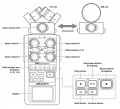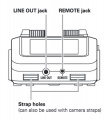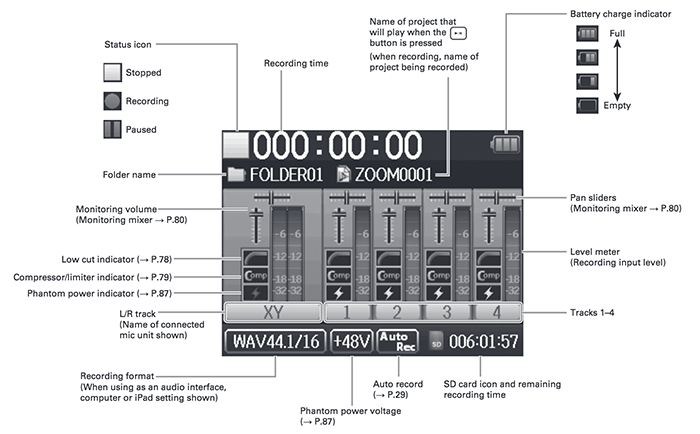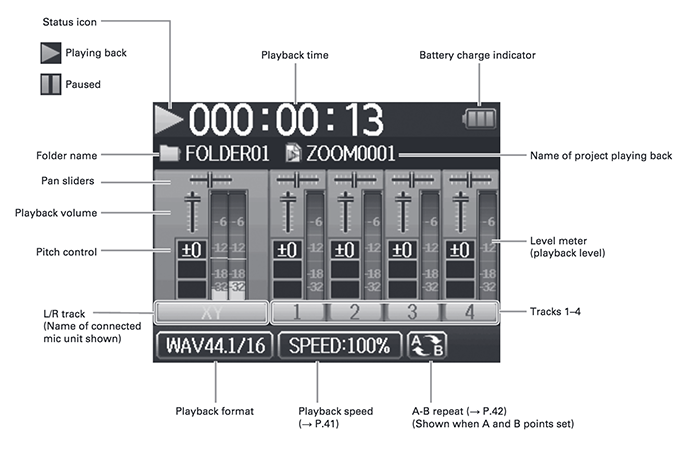APS/AS Zoom H6n Audio Recorder Operating Guide
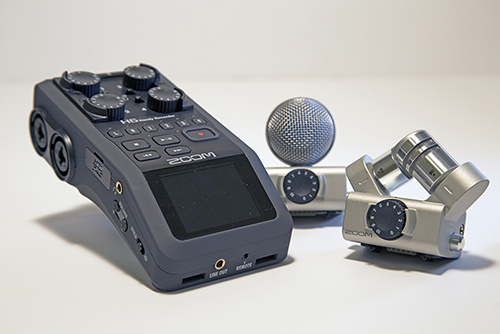
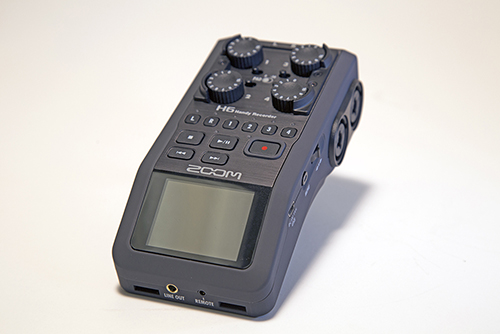
A proficiency test is required to check out this Audio Recorder. Schedule a proficiency at the front desk of APS, here, or by calling APS 360-867-5506 during APS operation hours.
Read this operating guide and complete the written portion of the test prior to your scheduled proficiency.
Bring your answer sheet with you to the test. The proficiency test should take approximately 30 - 45 minutes.
This operating guide is not a substitute for the complete manual, which you can download here: Zoom H6n Manual
Contents
- 1 Introduction
- 2 Safety Precaution & Care
- 3 Power
- 4 Operations
- 5 File Management
- 6 Using the H6N Recorder as an Audio Interface
- 7 H6N Chromatic Tuner
- 8 Using the Metronome
Introduction
The ZOOM H6N is a versatile and extremely portable 6 track field recorder for use in the field for sound collection, studio recording, and audio for video shoots. The H6N comes with one XY stereo field microphone and a cardioid mono capsule. Both of these capsules fit on the top slot on the recorder. There are also 4 XLR/Line in ports, each with their own individual volume, pad controls, and phantom power (+12V/ +24V/ +48V). It also features a headphone out jack and a 3.5mm line out jack that can hook up directly to a DSLR camera. Finally, the recorder features a metronome, chromatic tuner, and playback speed/pitch adjustments.
Safety Precaution & Care
- Do NOT subject the recorder to severe impacts or prolonged vibrations.
- Do NOT subject the recorder to extreme temperatures. Drastic temperature changes cause a condensation build up in electronics.
- Do NOT subject the recorder to water, sand, or mud.
- Do NOT use excessive force when operating this equipment.
- Do NOT drop the equipment!
- Always turn the power off before inserting or removing an SD card.
- Removing card while power is on may result in loss of data!
- When inserting an SD card, be sure to insert the correct end with the top side up as shown.
- When an SD card is not loaded, recording and playback are not possible.
YOU ARE 100% FINANCIALLY RESPONSIBLE FOR THIS EQUIPMENT UPON CHECKOUT!!!!
Power
Using Batteries
The Zoom H6n uses alkaline batteries or nickel metal hydride batteries.
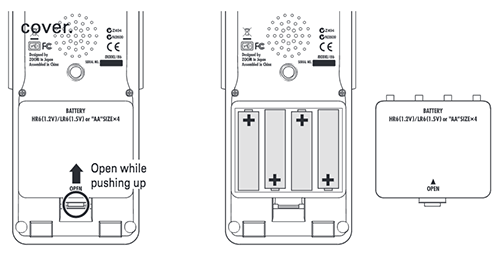
To place/replace batteries:
- Turn the power off and then remove the battery.
- Remove the battery cover.
- Install the batteries.
- Replace the battery cover.
- Select the correct type of battery you are using (Menu >> System >> Battery >> Alkaline or Ni-Mh)
If the battery indicator becomes empty, turn the power off immediately and install new batteries.
Using an AC adapter
- Connect a USB cable to the USB jack.
- Plug the adapter into an outlet.
Operations
Attachable Microphone Overview
The Zoom H6N kit comes with two attachable microphones, one is a stereo XY microphone and the other is a cardioid capsule, each has a L/R output.
XY Microphone
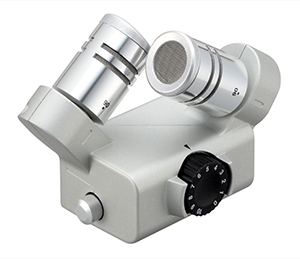
Has two crossing directional microphones which can be set for either 90 degrees or 120 degrees, dependent upon the field you wish to capture. Best for close/medium range recording (chamber music, live concert, interview, field recording, etc).
MS Microphone
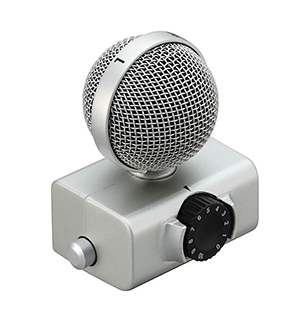
This microphone has a unidirectional mid-range microphone for central recording capture and a bidirectional microphone build in that can be adjusted to change the stereo field. This mic can capture a fairly accurate and crisp stereo field. Best for mono recording (interviews, narrations, and meetings).
Connecting and Disconnecting Attachable Microphones
Connection
- Remove the protective caps from the H6 main unit and the microphone.
- While Pressing the buttons on the sides of the mic, connect it to the main unit, inserting the connector completely.
Disconnection
- While pressing the buttons on the sides of the mic, pull it gently out of the main unit.
DO NOT SUBJECT THESE MICROPHONES TO HARSH TEMPERATURES, EXTREME WEATHER, OR IMPACT!!!
Connecting External Microphones/ Other Devices to Inputs 1-4
* Connecting External Microphones
Connect dynamic and condenser microphones to the Input 1-4 XLR jacks.
If a Condenser Microphone without dedicated power, set the onboard phantom power to (+12V/+24V/+48V)
* Connecting instruments/ Other devices
Connect keyboards and mixers directly in the input 1-4 TRS jacks.
Direct input of passive guitars and basses is not supported.
Set PAD to -20dB when connecting a mixer or other device with standard output level.
* Stereo Inputs
By linking tracks 1 and 2 (tracks 3 and 4) as stereo tracks, these can be used as stereo inputs.
In this case, input 1 and 3 become the left channels and 2 and 4 become the right channels.
Turning the Device On/Off
To Turn On
Slide the hold button to the right (Where the power symbol is).
To Turn Off
Slide the hold button the right again (Where the power symbol is).
Setting Date and Time
- Press the menu button.
- Use the scroll wheel to select “SYSTEM” and press the scroll wheel down.
- Use the scroll wheel, selected “Date/Time”, and press the scroll wheel down.
- Set date and time!
- Press the menu button again to return to the home screen.
Setting The Recording Format
Set the format according to the desired audio quality and file size.
- Press Menu.
- Use Scroll wheel to select “REC”, and press OK.
- Use Scroll wheel to select “Rec Format”, and press OK.
- Use Scroll wheel to select the desired format, and press OK.
NOTES:
- Use the WAV format for recording high-quality audio.
- The MP3 format reduces file size through compression, which also reduces the audio quality. Use this format if you need to conserve space on the SD card to store many recordings, for example.
- When recording in MP3 format, a single stereo MP3 file will be created regardless of the number of tracks selected. You can use the monitoring mixer to adjust the balance of all the tracks in the stereo mix.
Display Overview
Home Recording Screen
Playback Screen
Loading an SD Card
- Turn the power off and then open the SD card slot cover.
- Insert card into the slot.
- To eject an SD card: Push the card further into the slot and then pull it out.
Formatting SD Cards
- Press the menu button.
- Use the scroll wheel to select “SD CARD” and press down on the wheel.
- Using the wheel to select “SD CARD Remain” and press the scroll wheel button to see the amount of remaining open space on a card.
- To being the formatting process, press the menu button.
- Use the scroll wheel to select “SD CARD” and press the scroll button.
- Use the scroll wheel to select “Format” and press the scroll wheel button.
- Use the scroll wheel to select “Yes” and press down on the scroll wheel to format the SD card.
Recording
When recording with the Zoom H6n Audio Recorder, the following file structure/folders and files are created on the SD card:
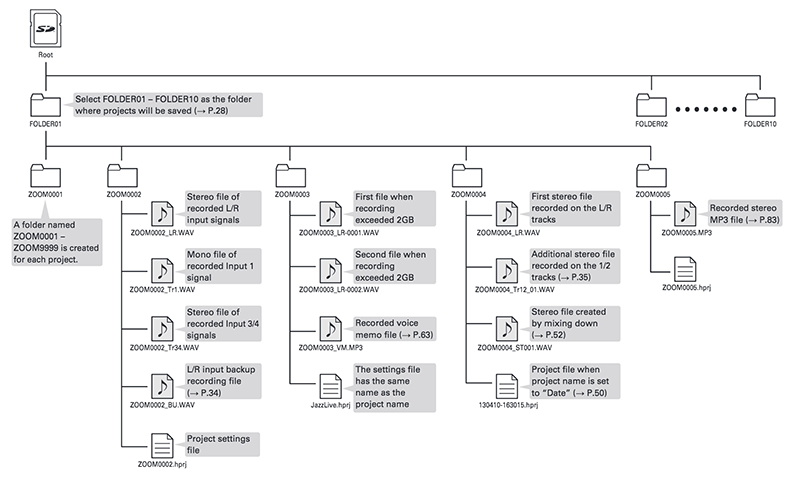
Automatic
- Press the menu button.
- Use the scroll wheel to select “REC” and press the scroll button down.
- Use the scroll wheel to select “Auto Rec” and press the button down.
- Use the scroll wheel to select on/off and press the button.
- Select “On” and press the button down.
- Return to the Home Screen, and press the record button and put the recorder in standby.
- Press the record button again to exit standby and stop recording.
Pre-Record
- Press the menu button.
- Use the scroll to select “REC” and press Ok.
- Use the scroll wheel to select “Pre-Rec” and press the scroll button down.
- Select “On” and press Ok.
Back Up Recording
When using the L/R input, in addition to the recording at the set input level, the recorder can also record a separate file at a level 12dB below. This backup can be used if the recording level was set too high, causing distortion, for example.
- Press the menu button
- Use the scroll wheel to select “REC” and press Ok.
- Use the scroll wheel to select “Backup Rec” and press Ok.
- Select “On” and press Ok.
HINT: If the name of the original file is, for example, “ZOOM0001_LR.wav”, the name of the backup file will be “ZOOM0001_BU.wav”.
Overdubbing
- Press the menu button.
- Use the scroll wheel to select “PROJECT MENU” and press Ok.
- Use the scroll to select “Overdub” and press Ok.
- Press the track button until the indicator lights red for the track to be overdubbed.
- Turn the volume knob to make adjustments.
- To monitor already recorded tracks, press their track buttons so their indicators light green.
- Press the record button to begin recording.
- Press the record button to stop recording.
- Press the menu button to stop overdubbing. When you play back or edit an overdubbed project, the last selected take will be used.
Playback
Normal Playback
- Press the menu button.
- Use the scroll wheel to select “PROJECT LIST”, and press Ok.
- Use the scroll wheel to select desired folder and press Ok.
- Use the scroll wheel to select the desired project and press Ok. Playback will begin.
Changing Playback Speed
- Press the menu button.
- Use the scroll wheel to select “PROJECT MENU” and press Ok.
- Select “Playback Speed” and press Ok,
- Use the scroll wheel to adjust playback speed, press Ok.
File Management
Delete Project
- To delete one project, press the menu button.
- Use the scroll wheel to select “PROJECT MENU”, Press Ok.
- Select “Trash” and press Ok.
- Select “Delete” and press Ok.
- Select “Yes” and press Ok.
- To delete all projects in a folder, select “Delete All Projects” instead, and press Ok.
- Note: Deletion of a project cannot be reversed!
File Transfers
- Press menu.
- Use scroll wheel to select “USB” and press Ok.
- Select “SD Card Reader” and press Ok.
- Connect the H6N to the computer using a USB cable.
- Make sure to safely disconnect the H6N from the computer when finished to avoid damage to the files and the recorder!
Using the H6N Recorder as an Audio Interface
- Press the menu button.
- Use scroll wheel to select “USB” and press Ok.
- Select “Audio Interface” and press Ok.
- Select either “Stereo Mix” or “Multi Track” and press Ok.
- Select either: “PC/Mac”, “PC/MAC using battery power” or “iPad using battery power”, and press Ok.
- Connect the H6N to the computer or iPad using a USB cable.
- Press the menu to disconnect.
- Select “EXIT” and press Ok.
- Select “Yes” and press Ok.
- Disconnect the cable from the computer or iPad and the H6, and press the menu button.
H6N Chromatic Tuner
- Press the menu button.
- Use the scroll wheel to select “TOOL”, press Ok.
- Select “Tuner” and press Ok.
- Select preferred tuning type and press Ok.
- Use the scroll wheel to adjust standard pitch.
- For all tuner types besides chromatic, use the forward and rewind button to change pitch (For drop tuning)
- Press a track button to select input to use.
- Use the tuner according to the type.
- Chromatic: shows pitch inaccuracies and note that the device is detecting.
- Guitar/Bass Tuning: The number of strings being tuned is automatically detected, allowing for tuning one at a time.
Using the Metronome
- Press the menu button.
- Use the scroll wheel to select “TOOL” and press Ok.
- Select “Metronome” and press Ok.
- Use the scroll wheel to select a menu item, and press Ok.
- Select “Click”, use the scroll wheel to set when the metronome is active, and press Ok.
- Select “Precount”.
- Select “Tempo”. Use the scroll wheel to select the speed, and press the menu button.
- Select “Sound”. Use the scroll wheel to set the sound and press Ok.
- Select “Pattern” use the scroll wheel to select desired musical pattern.
- Select “Level” and set to desired volume, press Ok.

